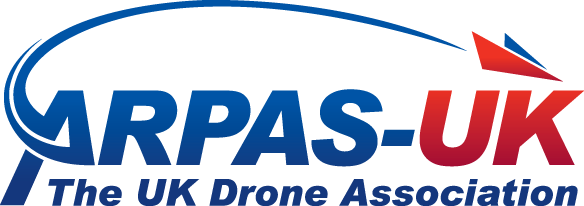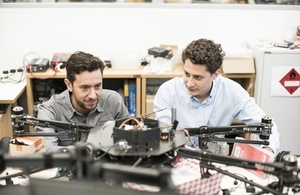A ground-breaking new project announced today (30th July) will build and then demonstrate how Open-Access UTM (Unmanned Traffic Management) capability can support drone operations below 400ft.
The Connected Places Catapult is bringing together a national and international consortium to develop a world leading Open-Access UTM framework for drones. The project, commissioned by the Department for Transport, will continue laying the groundwork for a safe flying environment for Unmanned Aircraft Systems (UAS) operations in the UK, enabling efficient sharing of airspace with manned aircraft and Beyond Visual Line of Sight (BVLOS) operations of drones.
There is a huge global opportunity for countries that can successfully accommodate commercial drone operations, it’s thought the sector could be worth £127bn globally. UTM is recognised as a key enabler to address the safe and efficient integration of unmanned vehicles into the airspace and Connected Places Catapult in collaboration with AiRXOS (part of GE Aviation), Altitude Angel, ANRA Technologies, Collins Aerospace and Wing will work towards the first set of the safe and regulated UTM capabilities this year.
This research and development project will create principal architectural features, communications interfaces and key services that will be evaluated through simulations before progressing to field-trials. The trial will build on existing platforms and standards to create a developmental system to explore UTM and drone operations, as well as identifying the next research steps and facilitating knowledge transfer to government and industry.
Dr. Ajay Modha, Principal Technologist at the Connected Places Catapult, said:
“This is an exciting opportunity to demonstrate a UK-specific UTM ecosystem and represents a key step in lowering the technology and operational barriers for UAS operations. A key objective is to demonstrate how this capability can support near term and future markets needs and ambitions. As Phase 2 of the Future Flight Challenge kicks-off, a key aim of this project is to provide greater insight and actionable data to the UAS community who may be tackling UTM for the first time”.
Ted Lester, Chief Technologist, AiRXOS said:
“After participating in the successful 2019-2020 effort with Connected Places Catapult to develop a framework for UTM in the UK, AiRXOS looks forward to demonstrating with peer UTM service providers safe, efficient, and economical UAS airspace integration to accelerate the beneficial use of UAS in the UK and around the world.”
On being chosen to take part in the Connected Places Catapult project, Richard Ellis, Altitude Angel, Chief Business Officer said:
“We are delighted to continue to work with CPC to continue validation of the Open UTM framework we pioneered in 2019. The live trials will benefit significantly from Altitude Angel’s existing extensive API’s and experience of providing production services across the world. We believe this will form a solid foundation for the UK to establish repeatable and scalable drone operations.”
Amit Ganjoo, CEO and Founder of ANRA Technologies UK Pvt Limited said
“The UK is rapidly becoming a global leader in advancing commercial drone technologies. We are honoured to have contributed to all Connected Places Catapult Open-Access UTM Research and Development Programmes and are excited to commence live-flight testing in pursuit of a safe, interoperable, and efficient traffic management system,”
Sean Camilleri, Principal Strategic Development Manager at Collins Aerospace said:
“This ground-breaking program gives us the opportunity to test out the most prominent emerging standards and theories of UAS traffic management and put them to the test in collaboration with our peers. Successful trials will enable us to move another step closer to unlocking the full social and economic benefits of beyond visual line of sight drone operations in the UK”.
James Ryan Burgess, CEO at Wing said:
“Drones and the services they provide present significant benefits to the United Kingdom, supporting emergency response, reducing emissions and air pollution and increasing access to food, medicine and other goods. We’re pleased to be joining the Catapult project to advance the safe and open use of the airspace and look forward to bringing our global experience to enable a scalable and low cost UTM architecture that can support the volume and diversity of unmanned aviation.”
Note to Editors
This project will build on the UTM and Government Drone Pathfinder activity that Connected Places Catapult has published previously:
- Towards a UTM system for the UK – October 2019 https://cp.catapult.org.uk/2019/09/30/new-report-points-way-to-shared-airspace-between-drones-and-traditional-aircraft/
- Enabling Unmanned Aircraft Traffic Management in the UK – May 2020
https://cp.catapult.org.uk/2020/05/22/enabling-unmanned-traffic-management-in-the-uk-report-launched/
Future Flight Challenge
Future Flight is one of several challenge areas set-out by the UK government’s Industrial Strategy which is a long-term plan to raise the productivity and earning power in the UK. The Future Flight programme is funded by £125 million from the Industrial Strategy Challenge Fund which is expected to be matched by up to £175 million from industry. The challenge will cover four areas of activity:
- Control and regulations including air traffic management
- New operating models
- Ground infrastructure
- Integrating new aircraft with a new aviation system
This challenge aims to revolutionise the way people, goods and services fly and position the UK as a world leader in aviation products and markets worth over $675 billion (£559bn) to 2050.
It will support the development, in the UK, of new technologies from freight-carrying drones
to urban air vehicles to hybrid-electric regional aircraft. These new modes of travel will
increase mobility, reduce road congestion, improve connectivity, increase UK manufacturing
opportunities and help aviation to reduce its environmental impact around the world.
Government Drone Pathfinder Programme
Connected Places Catapult manages the Drones Pathfinder Programme in partnership with the Department of Transport (DfT) and supported by the Department for Business, Energy and Industrial Strategy (BEIS) and the Civil Aviation Authority (CAA). https://cp.catapult.org.uk/pathfinder/



